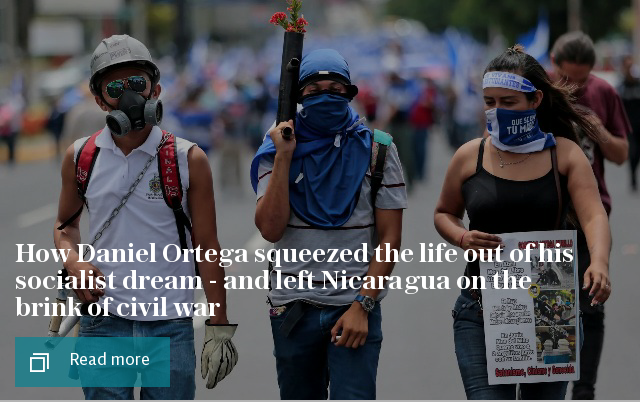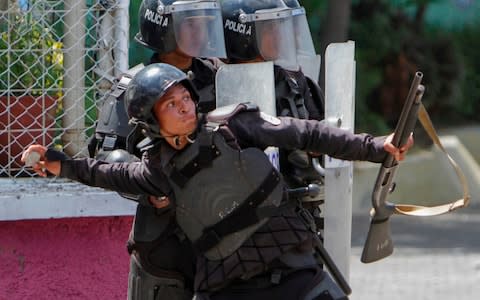Daniel Ortega unleashes Orwellian repression as Nicaragua accused of torturing protesters
The dawn silence was broken at Jaime Navarrete's home in a quiet neighbourhood of Managua, Nicaragua, when government thugs crashed through his door, beat him to the ground and looted his house.
A stone's throw from the site of fierce clashes between protesters and forces loyal to socialist president Daniel Ortega, Mr Navarrete, 30, was seemingly paying for his attendance at mass marches that swept the country earlier this year.
After his thrashing he was bundled into a white pick-up truck and swiftly delivered to the police. Over the next few days, he was tortured in El Chipote prison, a now infamous jail for protesters and dissenters locked up in arbitrary detention during the six-month civil movement that threatened - but ultimatum failed - to bring down Nicaragua’s government.
Between April and June, hundreds of thousands marched in cities across Nicaragua, while others established roadblocks in an attempt to force expedited elections and topple an increasingly autocratic leader.
The response - detailed in a new report on torture by Amnesty International on Thursday - was brutally efficient.
In a process nicknamed ‘Operation Clean-Up’, the government unleashed squadrons of masked gunmen – the same forces that kidnapped Mr Navarrete – who worked with police to clear the barricades and kill hundreds that stood in their way.

Since regaining control of the country for the government, the same goon squads have pursued a nationwide hunt for protest leaders. Mr Navarrete was caught in the net, as was his wife who was sexually assaulted when their home was raided.
“When I saw him, his neck and back were covered in burns, and his body bruised by beatings,” Mr Navarrete’s mother, Margine Blandon, told The Telegraph, after meeting finally meeting her son after he was released from El Chipote prison.
A report launched on Thursday by Amnesty International, Instilling Terror, shows that Mr Navarrete's experience is far from isolated.
“Torture is being used not solely as an instrument of punishment, but as a means of dissuading others from protesting,” says Carolina Jimenez, Americas deputy director for research at the rights charity. “It is one element in a strategy of lethal repression intended to terrorise the population.”
Amnesty researchers documented 12 further examples of torture, involving rape and electrocution, as well as five extrajudicial killings. Earlier this year the UN documented more grueling examples of torture, including prisoners being raped with rifles.

The report also covers the criminalisation of protesters, more than 400 of whom are currently languashing in Nicaragua’s prisons. Many are being tried under hasty anti-terror laws passed in July by the government-controlled National Assembly.
“We’ve known for years that there is a grave problem with the lack of independence in the Nicaraguan justice system,” explains Jimenez. “Now we are seeing it deployed as a weapon of repression, to criminalise all dissidents that demand change.”
The largely peaceful anti-government protests that broke out in April this year were sparked by fiscal reforms cutting pensions and disability payments, though activists highlight a decade of growing authoritarianism under president Daniel Ortega, whose socialist credentials have all but disintegrated in recent years, as the deeper cause.
“We’ve witnessed the destruction of Nicaragua’s democracy,” says Azahalea Solis, a member of the opposition Blue and White Alliance. “From the army and police, to the trade unions, the prosecution service, the supreme court and electoral council, all have been brought under Ortega’s control.”
On Tuesday, a group of three student leaders were sentenced to 17 years in prison each on new terrorism charges, introduced in the midst of protests.
“It is absurd that Nicaragua has gone from being the safest country in Central America to having more than 300 terrorists in jail – many of them students,” their lawyer, Julio Montenegro, told The Telegraph.
Despite the ferocious repression, activists are determined to keep resisting.
“The civil struggle will continue,” Ms Solis says. “We’re far beyond the point of no return.”

 Yahoo News
Yahoo News 
